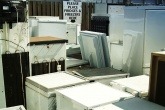New EU regulation to crack down on WEEE freeriders

Any retailer selling electrical goods must follow government regulations and provide a way for customers to dispose of the electrical items, either by providing a free in store take back service, or by setting up an alternative free take back service.
The WEEE Regulations 2013 state that: ‘Producers of electrical and electronic equipment (EEE) are responsible for financing and ensuring the disposal of end-of-life products in an environmentally sound way arising from both household and non-household users.’
However, with increasing use of online shopping platforms and marketplaces such as Amazon, identifying producer responsibility can be more complicated, leading to the practice of ‘free-riding.’ This is where online retailers sell products directly to households in the EU from producers based outside of the EU and are therefore not registered with WEEE compliance schemes, avoiding national producer responsibility obligations, including paying compliance fees.
In 2018 the Organisation for Economic Co-operation and Development (OECD) published a report urging governments to enforce stricter regulations to tackle the issue of free-riding and ensure the correct extended producer responsibility (EPR) regimes are in place. In that vein, in January 2019 the French Government introduced new rules requiring online retailers to prove that all of the products sold through their platforms have had an ‘eco-contribution’ paid on their behalf.
The EU’s ‘Regulation on market surveillance and compliance of products,’ set to be enforced in July 2021, states that companies must appoint an economic operator in the EU to verify that compliance documentation has been prepared and is available for market surveillance authorities.
Nigel Harvey, Chief Executive of Recolight, UK WEEE compliance scheme for the lighting industry, said: “It is great to see online marketplaces and fulfilment houses at last being held to account where non-compliant product is sold through their platforms. For too long, some have avoided tackling the issue, even when non-compliance has been brought to their attention.”
Harvey added: “Although an improvement, the proposed system is not watertight. UK enforcement bodies could still struggle to take action against an appointed economic operator based, for example, in certain East European countries.
“So, when it comes to tackling the online non-compliance of product with WEEE, packaging and batteries, we very much prefer the UK Government’s approach, as outlined in their packaging regulations consultation. That is to make the online marketplace responsible for the compliance of all products for which it facilitates the import into the UK. It is simpler to enforce, and less burdensome for producers based outside the EU.”
The WEEE recycling sector in the UK will be hoping for better recycling performance in 2019 after falling short of WEEE collection targets in 2018, collecting 492,532 tonnes of household WEEE, some 44,500 tonnes short of the target of 537,065 tonnes









